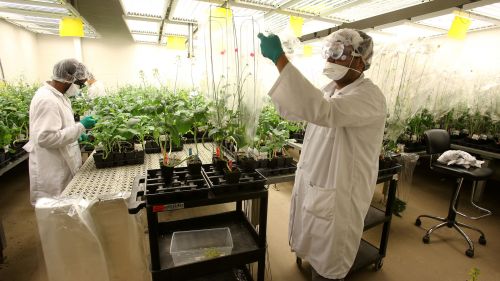Agricultural Innovation Can Feed the Planet, But It Needs Policy Support

As technology expands what is possible in our food system, inefficiencies can arise and make it difficult for policy to change as rapidly as our technology does.
Agri-food tech
While Chicago is particularly successful, the world of agri-food tech is booming everywhere. Investments in the field are on the rise and have been for several years. New innovations are coming to market, and they range from improved seed varieties to ever-increasing animal protein alternatives. As innovation offers novel food security solutions, it is necessary to ask if policies are keeping up.
Milk, Meat, and Genomes
Many companies and researchers are working to develop the future of food. Some of the results seem to verge on the unimaginable, while others feel like variations on a familiar theme. Many could become a breakthrough for food security. One company has found a way to create “animal-free dairy milk” using fermented flora. Cultured (cell-based) meat is getting closer to market viability. Either could signal a breakthrough in the way that protein is produced, saving precious land and water resources, and reducing greenhouse gas emissions. As countries’ incomes increase, so does demand for meat. Developing more resource-efficient methods of producing animal protein could help meet that demand without increasing the burden to the planet.
The public and private sectors alike have made advancements in improved seed varieties. Some improvements are reached using the still relatively new gene-editing method called CRISPR-Cas9. This technique can silence, edit, or insert genes into a plant’s DNA, producing inheritable changes in a plant’s genetics that are almost impossible to trace. CRISPR, as it is commonly referred to, is being used to create tomato plants with that bear more fruit, mushrooms that do not brown, more productive rice, and citrus that is resistant to citrus greening disease.
Are policies as savvy as the technology?
As technology expands what is possible in our food system, policies must keep pace. When countries or even states have different approaches to agri-food tech advances, inefficiencies can arise, and it is difficult for policy to change as rapidly as our technology does. The EU and several US states have decided to prevent plant-based foods from using words associated with animal products, like “burger” or “milk.” This decision may force companies to invest in different labeling depending on where they are selling a product, or to simply not sell in an area at all. It also raises questions about how policymakers will approach cultured meat, or animal-free dairy—both seen as environmentally friendly foods of the future. How will lab-grown meat be defined? If a plant-based milk naturally contains whey and casein, two proteins found in dairy milk, can it be called milk? How will disparate policies affect commerce?
Divergent policy around genetic engineering has been a source of confusion that will likely continue. USDA Secretary of Agriculture Sonny Perdue issued a statement in 2018 which clarified the agency’s position on gene editing. Viewing the process as not substantively different from traditional selective breeding, the USDA does not subject genetically edited to the same regulatory oversight required for transgenic modification. The European Union took the opposite approach when its Court of Justice ruled that gene-edited crops were subject to its stringent regulations on genetically modified organisms. Some gene edits are nearly indistinguishable from natural mutations in a DNA, making detection and enforcement of restrictions difficult.
The gene-editing policies that are adopted in low- and middle-income countries (LMIC) will have broad trade and food security ramifications.Staple crops that can be improved by gene-editing can help vulnerable nations build food security resilience to climate change. Argentina and Brazil both have adopted policies that allow for flexible, case-by-case regulation of gene-edited crops, which have been seen as potential regulatory models for other nations. The Ugandan Ministry of Science, Technology, and Innovation has looked to Brazil’s policy as one inspiration for how they will approach new gene-edited products. This could have a bearing on Ugandan researchers’ work developing a disease-resistance cassava, which is cultivated in 40 of the 53 countries in Sub-Saharan Africa, predominantly on small farms.
LMIC hoping to develop and grow gene-edited plants will be making implicit decisions about which agricultural products they can trade, and with whom. There are strong trade relationships between the EU and Africa and some experts fear that navigating regulations could hinder biotechnology development on the continent. After Ghana’s Environmental Protection Agency released a study finding that the country’s climate would be unsuitable for growing cacao by 2080, researchers got to work using CRISPR-Cas9 to develop a climate-resistant cacao variety. If Ghana invests in these seeds, that could have far-reaching implications--Ghana is the world’s second-largest producer of cocoa, and the EU consumes over half of the world’s cocoa beans.
Collaboration and Coordination can Point the Way Forward
Achieving zero hunger will require a global effort, utilizing the latest scientific advances across sectors and international borders. While some aspects of new technologies are still ambiguous, the solution is increased research, discussion, and inquiry—not less. As the Council has recommended in several publications, now is the time for more international, cross-sector coordination and collaboration. More research is needed to determine the full range of benefits and challenges that new agri-food technologies can pose. An increase in communication and partnership between universities, established companies and VC startups, and research institutions around the world will allow for faster dissemination of agri-food tech, best practices, and evidence-based policy recommendations. Chicago may be a leader of agri-food startups, but we can’t solve the world’s food insecurity alone.

